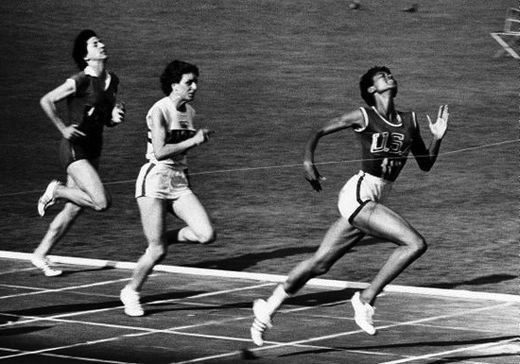
Olympic gold medal sprinter Wilma Rudolph was born at Bethlehem, Tenn., on June 23, 1940.
Rudolph won the 100- and 200-meter sprints and the 400m relay at the 1960 Rome games, becoming at age 20 the first woman to win three gold medals at the same Olympics. While still in high school, Rudolph – nicknamed “Skeeter” for her famous speed – qualified for the 1956 Olympics in Melbourne, Australia. The youngest member of the U.S. team, at 16, she won a bronze medal in the sprint relay event.
Rudolph’s story is truly a tale of overcoming formidable obstacles. She was born prematurely at 4.5 pounds, the 20th of 22 siblings; her father was a railway porter and her mother a maid. Rudolph contracted infantile paralysis (caused by the polio virus) at age four. She recovered, but wore a brace on her left leg and foot (which had become twisted as a result) until she was nine, and underwent intense corrective physical therapy. She wore an orthopedic shoe on that foot for another two years. By the time she was 12 she had also survived bouts of polio and scarlet fever.
“My doctors told me I would never walk again,” she said. “My mother told me I would. I believed my mother.”
In 1953 Rudolph finally shed her handicap. An older sister played basketball, and Wilma wanted to follow her footsteps. While at the all-black Burt High School – segregation was still the rule – Rudolph played on the basketball team when she was spotted by Tennessee State track and field coach Ed Temple, who saw a natural athlete in her. She had already gained some track experience in between basketball seasons. At 16 she returned to high school from Melbourne with her bronze medal.
After high school, Rudolph enrolled at Tennessee State University, where she studied education and trained hard for the next Olympics.
In 1959, Rudolph won a gold medal in the 100m relay at the Pan American Games and an individual silver in the 100m. The same year she won the Association of American Universities (AAU) 100m title and defended it for four consecutive years. She also won three AAU indoor titles.
The 1960 Olympics catapulted Rudolph to worldwide fame as “The Tornado, the fastest woman on earth,” in part owing to the first international television coverage of the Olympics that year. She elevated women’s track to a major presence in the United States. As an African American, she is also regarded as a civil rights and women’s rights pioneer.
As the temperature reached 110°F, 80,000 spectators jammed the Olympic Stadium. Rudolph ran the 100m dash in an impressive 11 seconds flat. However the time was not credited as a world record, because it was wind-aided. She also won the 200m dash in 23.2 seconds, a new Olympic record. Finally, on September 11, 1960, she combined with Tennessee State teammates Martha Hudson, Lucinda Williams and Barbara Jones to win the 400m relay in 44.5 seconds, setting a world record. Rudolph felt inspired by Jesse Owens, the celebrated black American athlete who had been the star of the 1936 Olympics in Berlin.
When Rudolph returned home to Clarksville, Tenn., at her wishes, her homecoming parade and banquet were the first fully integrated municipal events in the city’s history. Rudolph retired from track competition in 1962 after winning two races at a U.S.-Soviet meet. She later worked as a teacher and track coach, married and had four children.
Rudolph’s 1977 autobiography, Wilma, was turned into a TV film. In the 1980s, she was inducted into the U.S. Olympic Hall of Fame. She established the Wilma Rudolph Foundation to promote amateur athletics.
Rudolph died of brain cancer in 1994. In 2004, the USPS featured her on a 23-cent stamp.
One of the fastest women in track and a source of great inspiration for generations of African-American athletes, Rudolph once stated, “Winning is great, sure, but if you are really going to do something in life, the secret is learning how to lose. Nobody goes undefeated all the time. If you can pick up after a crushing defeat, and go on to win again, you are going to be a champion someday.”
Adapted from biography.com, Wikipedia and other sources.












Comments